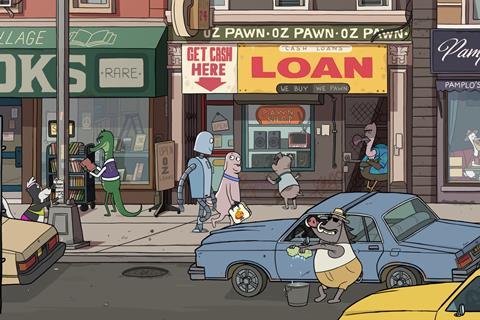
Producing films for an international audience has always been at the heart of Sandra Tapia’s career.
Tapia joined Barcelona-based Arcadia Motion Pictures in 2009, a company founded in 2004 by producer-director Ibon Cormenzana and quickly produced features including Pablo Berger’s silent film Blancanieves and Mateo Gil’s English and Spanish-language western Blackthorn, starring Sam Shepard.
Arcadia produces three to four features a year, working closely with directors such as Berger and Rodrigo Sorogoyen. Sorogoyen’s Mother screened at Venice in 2029 and his The Beasts was selected for Cannes in 2022. Berger’s feature animation Robot Dreams was at Cannes in 2023 and went on to score an Oscar nomination for best animation in 2024.
The company’s 2024 slate includes Celia Rico’s second film Little Loves which debuted at the Malaga Film Festival
Tapia is the recipient of the inaugural Screen International Catalan Producer of the Year award, to be presented at the opening night of the BCN Film Fest in Barcelona today (April 18).
The BCN Film festival runs through April 24 and will showcase Spanish productions including the international premiere of Dani de la Orden’s House On Fire, and the Spanish premieres of Meg Ryan’s What Happens After, Vincent Pérez’s The Edge Of The Blade and Richard Linklater’s Hit Man.
Catalan cinema is thriving. Is it sustainable from a producer’s perspective?
It’s a good moment to produce in Catalonia. There are new players, like the streamers, that give you more options as an independent company.
ICEC, the Catalan Film Body, plays a key role in the support of the industry and allows for extra financing. We also have the support of the public broadcaster (Televisió de Catalunya). Talent abounds, not just filmmakers, but also technical crews, postproduction labs and also producers.
How has the streaming boom in Spain impacted you?
Costs have gone up for sure and you also need to look for talent much further in advance. You sometimes have to remind crews and actors that there’s a difference when a producer takes on an independent project compared to a streamer original, and therefore you cannot pay exactly the same.
When starting a project, the key is to decide the best road to take. Both The Beasts and Robot Dreams could have been streamer originals but we thought they were films made for the big screen and for the festival circuit. As independent producers we defend the right to keep the IP not just for financial reasons but to keep this independence. We cannot all just become service production companies for streamers.
But streamers have given us new opportunities and [the streamer boom] has been good for the industry. At Arcadia we are very happy to combine independent productions with working with streamers, as we did with miniseries Burning Body for Netflix.
Which part of the production process do you most enjoy?
I always underline the role of a producer as a creative agent in the process. It all depends to what degree the screenwriters or directors want you to get into the creative process. Some are prepared to share the first version of the screenplay and work together; others don’t.
But as a producer there is always a creative part of the job from casting to marketing; it’s not all about financing. The key is that both producer and filmmaker make the same film.
I always do two different readings of a project. The first, from an audience point of view. I ask myself: is this a film I want to work on for three years to see it on the big screen? After that comes the reading as a producer: can I make it happen? What is the potential audience, is it a festival kind of feature, is it a potential co-production? Who could distribute?
I also enjoy the scriptwriting process and the postproduction and marketing, two stages that have to do with what you want the film to be on one hand and how you want the film to reach its audience.

What are the benefits of international co-production?
We have tended to work with France because of the filmmakers we work with and/or their projects, like in the case of The Beasts [a coproduction with Spain’s Caballo Films and France’s Le Pacte) and also because France is a strong partner as it’s a country with a significant know-how about minority co-productions and a long tradition of working with Spanish companies.
There have been other natural co-productions. For example, we co-produced Marcel Barrena’s Mediterráneo: The Law Of The Sea with Greece’s Heretic [about the refugee crisis in Europe] and we co-produced Claudia Llosa’s Aloft with Buffalo Gal Pictures in Canada as the main character [played by Jennifer Connelly], worked on a Canadian farm. The story was set in a very cold landscape and Manitoba offered very good tax incentives.
What do you believe you bring as the Spanish partner?
It’s a balance between the knowledge of the industry in Spain, our contacts with distributors, broadcasters, and the financing opportunities through public funding and tax credit, as well as our belief in the importance of giving creative freedom to filmmakers to make the story they want.
What has been the impact for you of the Oscar nomination for Robot Dreams?
It has made me reflect on the relevance of every step you take at each part of the process. We thought Robot Dreams could work in the US from the first reading of the project. Cannes played a key part in launching the film and from then on we have worked both the specialised animation festivals and general content festivals, the distributors in all the territories have got very involved. Neon is now releasing it in the US on May 31.

























No comments yet